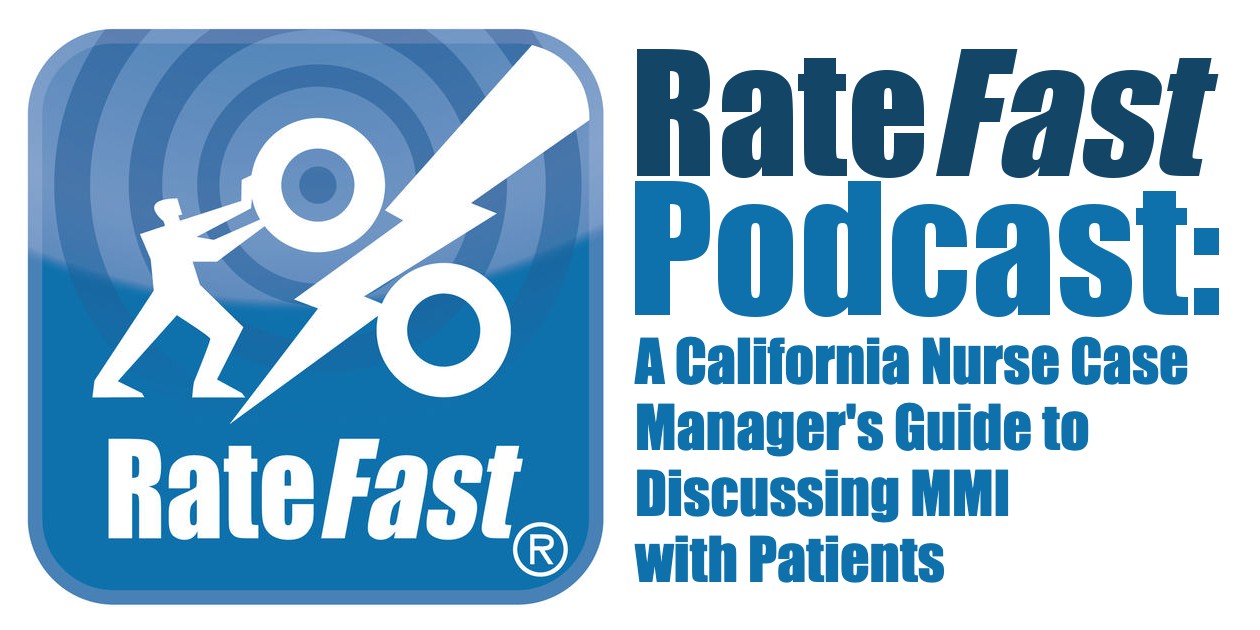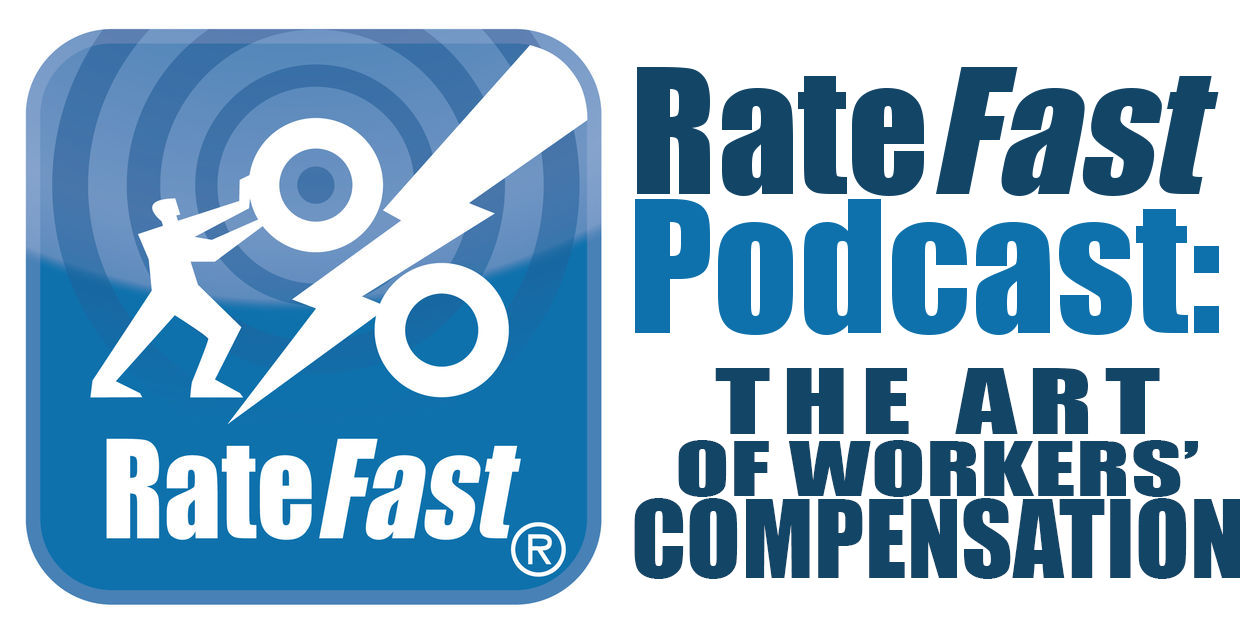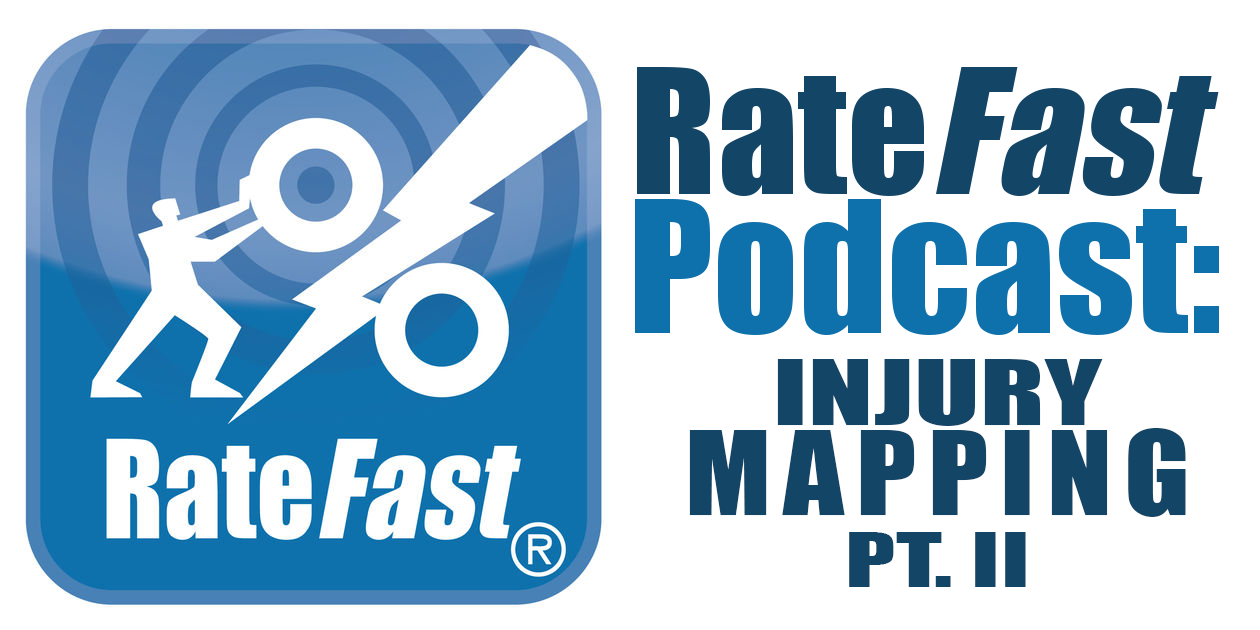Dr. John Alchemy answers questions submitted by Nurse Case Managers regarding ways of discussing common work comp questions with their patients.
If you’re a workers’ compensation provider, adjuster, or case manager check out RateFast Express: the service that writes your impairment reports for you!
A California Nurse Case Manager’s Guide to Discussing MMI With Patients
Cory Oleson (Host): Welcome back to the California Work Comp report. Today is Tuesday, August 3, 2021. This is your host Cory Oleson here with Dr. John Alchemy. For today’s episode, we have a California nurse case manager’s guide to discussing MMI with their patients.
And we are live with the California workers comp report. It is me Cory, like you heard in the introduction. And I’m here with Dr. John Alchemy. How are you today, John?
Dr. John Alchemy: Good afternoon, Cory. How are you doing?
Cory: I’m doing all right, just a kind of a humid day over where I’m at. But that’s just fine.
So the topic of the podcast today is a nurse case managers guide to discussing MMI, which is maximal medical improvement with patients in California workers compensation. And we had previously done an episode on nurse case managers, that will be linked in the description. But you know, we owe it to ourselves to do a little brush up of it. And remember what what a nurse case manager is, and a couple other points about them. So John, what is a nurse case manager as in respects to California workers compensation?
Dr. John Alchemy: A nurse case manager is a nurse with obviously nursing background, it could be a licensed vocational nurse, it could be a registered nurse, it could be a telephonic nurse. But this is an individual with a medical background that is assigned to assist with an injured worker for some reason, like for instance, if it’s a catastrophic car accident, multiple injuries, they’re in a wheelchair, they need home health, they’re going to be in a rehab facility, a nurse case manager will be assigned to that to help the injured worker and the insurance company navigate the work comp system, getting them to their appointments, logistics, making sure medications get to them on time and, and all of that sort of thing.
They can be assigned to someone who has a significant social challenge. Maybe they’re homeless, I’ve had that happen before and they’re living out of their car. They don’t speak English very well, or English isn’t their first language or they can’t read. I’ve had a couple of patients that are illiterate and just, you know, can’t read anything that gets sent to them. Maybe they don’t have internet, maybe they you know, can’t even get an email. So there’s a lot of reasons why nurse case managers can get assigned, but the main take home as they’re assigned, because the injured worker needs help.
Cory: Yes, absolutely. So it doesn’t, it doesn’t necessarily mean that there’s any sort of like, legal ramifications to the claim the way that you know, if an attorney was involved or something like that, it’s simply that the patient needs help. And, you know, that would help everybody else close the claim.
Okay, so a nurse case manager assigned to a claim to help a patient get to their appointments or do other things that, you know, they’re just kind of thrust into the system all of a sudden, and, you know, oftentimes they need assistance. And so this nurse case manager, where do they come from? I mean, who assigns them? And, you know, it sounds like there’s multiple reasons that one could, you know, come on a claim, but are there, you know, specific or common reasons why a nurse case manager would would jump on the claim?
Dr. John Alchemy: Well, usually they’re assigned by the insurance adjuster, the adjuster is either become aware that there’s going to be some significant challenges in delivering or coordinating care, or, often myself, I will identify that from the primary treater. The patient comes into clinic, you know, I just can tell that they’re going to have a hard time they, you know, really need a lot of help a lot of instruction, a lot of redirection. And I’ll actually just put in a request for authorization for nurse case manager, I’ll maybe put it in there for six months or three months, or just enough to help them get through a surgery and recover and then you know, we can kind of take it from there.
So it can be a doctor. It can be the insurance company, usually. But I would say, you know, either one can assign it. And the biggest question I always get from the injured worker, because nurse case managers come to the appointments so they know what’s going on. They ask questions, they find out what the next steps are. They write reports, submit those to the insurance adjusters, the adjuster knows what’s going on. But the most common question I get from the injured worker, is this nurse case manager hear from the insurance company to spy on me?
And most common concern is that, you know, this nurse case managers hear, you know, because they’re, you know, want the insurance, they want to help the insurance company out and they don’t want to help me. And I think that’s the biggest misconception that I need to realign people’s thoughts around and let them know no, this nurse case manager is really here as an advocate for the claim. The insurance company pays everybody they pay the doctor, they pay me you know, I’m paid to take care of you. It’s we’re all paid by the insurance company. But we’re all supposed to have the goal of you know, getting you better doing what’s right and not ordering things that are going to hurt you. So we often will have to get some of the patients back on track and let them understand that, you know, having a nurse case manager is really a benefit and not a handicap in the case.
Cory: Absolutely. Absolutely. To all of the people who developed a very, very specific and lofty ideas over the last year, I can say that nurse case managers are not a sysop.
Dr. John Alchemy: Thank you for clarifying that.
Cory: They work neither for the FBI or the CIA. As far as I know.
Okay, so you’ve clarified that they don’t work for the insurance company. You also, you know, it’s natural to assume that okay, who’s this person all of a sudden, who’s going to be giving me rides or something like that? But yeah, they’re nurses just kind of got, you know, they got assigned to the claim to help.
Dr. John Alchemy: Yeah, they’re a paid advocate. And obviously, the insurance company pays pays their bills.
Cory: And that’s a good point that, you know, for work comp claims and everything the insurance companies pay you as well. And that’s, you know, any, if there’s any nurse case managers listening, who has to tackle that sort of suspicion, or like, or establish some sort of trust with their patient or anything, I think that’s a wonderful point to make, or that would just drive them insane thinking about now the doctors working for the insurance company!
Dr. John Alchemy: It really becomes clear.
Cory: Yeah, at that point, if your patient is kind of on that on that vibrational level, then there’s nothing much you could have done anyway. And, and that’s what would happen if you got me as a patient if I didn’t talk to John. So, um, so how long is the nurse case manager on the case?
Dr. John Alchemy: Yeah, so they, they run on the case, typically, until the case reaches MMI. And on our podcast, we always like to talk about maximum medical improvement or time to write the case or 12 months, no change with or without treatment, which is MMI. So they’re there to get the patient as well as they can. And then they sign off the case.
Cory: Yeah. And MMI in the words that I could only understand when I started doing this podcast was as good as you’re going to get after. Which is a very subjective thing. And the funny thing is that, you know, the, I mean, it’s not the patient that walks up and says, I’ve reached MMI. If only it were that easy. Because it’s all the other people who think that it’s the doctor that’s supposed to say that and everything but or to determine that, but, um, so now, okay, so we have our framework for what a nurse case manager is, it’s a professional nurse who has been assigned to a patient, when a claim needs help, the person who assigns them can either be from the insurance company, or the doctor themselves, or possibly even another stakeholder in the claim, if there was like an attorney involved, I guess they could recommend it.
Dr. John Alchemy: Sure, yeah. Possibly.
Cory: And they do basically, any kind of task that is required to make sure that the patient makes it to their appointments, and that their work comp claim goes smoothly, including attending the appointments, which is just part of the part and parcel with being a nurse case manager, for a work comp claim. So the next portion of our podcast here today is that we actually asked a nurse case manager, what are the most common questions that you get from your patients?
And what we’re going to do is we’re going to provide those for you today. So that you have those answers kind of in your back pocket, when, as we understand, inevitably, these questions are asked to you. So I’m going to start off with the first question here. And the first commonly asked question from patients to nurse case managers, John, is, how does the MD come up with impairment ratings? And does pain come into play?
Dr. John Alchemy: Yes, common question, how does this number get made? So we need to tell these injured workers that when you’re done, we need to figure out what your loss is, and how much you’ve lost as a result of the injury. So we have a book, we have a book in California. It’s basically a doctor’s recipe book, if you will, and it tells the doctor how to do a special exam based on the part of your body that got hurt, and come up with a percentage loss of that body part. So for instance, your whole body is worth 100%. Meaning if you’re in a coma, you’ve lost 100% of your of your person, if your arm or to be removed, unfortunately from an accident, you know, you would lose 60% of your person for that, or 40% if you lose a leg, so it’s based on a percentage of an entire person.
And, and there’s special rules, it’s a special exam. It’s not the typical exam that you might get when you’re going in for a route, recheck or even your first visit. But it’s it’s a physical exam that allows the doctor and the insurance company to take your findings, your findings alone, and put them into a context of how much you’ve been injured, and how much function you’ve lost as a result of your particular impairment. And yes, pain definitely does come into play. Pain is considered in all of the ratings and all of the body parts, pain and or symptoms. So that’s definitely part of it, what you can do, what you can do at home, what you can no longer do at home, how fast you can do it, or if you can even do it at all. All of that is placed into the context of your impairment rating.
Cory: Yes, the way that I was thinking about the AMA Guides, when you were describing it just now as I’ve never thought of it in the context of if I was talking to somebody who had never heard of them before, anything like that, and I just had the idea. The AMA Guides is is a lot like almost like a math book, where instead of the one train leaves from Chicago when train leaves from LA, you know, it’s your body.
Okay, so question number two, does the PTP or primary treating physician have to agree with the final final report recommendations? What if a qualified medical examiner or QME says says that the injury is permanent and stationary, but they want to continue treating the patient? Or vice versa? What happens if, if the insurance company says you are not permanent and stationary? But the doctor says they most definitely are, what happens? I guess in either scenario?
Dr. John Alchemy: Well, let me just clarify for everyone. So the QME is a state assigned doctor and the insurance company can call that at any time. So if your treating doctor for some reason, you know, isn’t writing clear reports, or that doesn’t clear to be a clear arc on that treatment plan and stuff. Sometimes, the insurance company will order a state qualified medical evaluator this can be ordered by patients as well. And they’re supposed to step in, you pick a specialty, and they’re supposed to step in, and basically just give an opinion. Remember, these doctors are not allowed to provide any treatment, and they’re not allowed to direct treatment, they can make treatment recommendations, but they can’t say, you know, I’m going to give you Advil, or I’m going to do shoulder surgery on you next week to fix your problem. So they’re only there as consultants.
And the insurance company can choose to, you know, follow the QME report, or they can choose to follow the PTP or a combination of both. Often what happens is a QME report comes back, the insurance adjuster will say, hey, the QME he thought that this patient needs maybe some further testing, what do you think primary treater? And the treater can say yes or no. Sometimes the QME says, oh, no, I think this person is reached maximum medical improvement, there’s nothing more to do for them. And, you know, here’s the rating value, and that can go the wrong way, too. I had a case where a QME basically gave my patient who couldn’t raise their shoulders, at or above shoulder level, they gave him a 0% impairment and said, there’s nothing else to do. This case was MMI.
And I wrote back and I said, well, I respectfully disagree. The patient hasn’t had any therapy. They’ve had no X rays. Their arm doesn’t work. So it’s like, you know, I don’t I not really quite sure what planet that QME may have done this exam on, but I’m pretty sure that it’s not maximally medically improved. And you can always tell the insurance company and the patient yeah, take this into the state have, you know, have a judge look at this. You know, if this just doesn’t make any sense at all.
Usually, it’s not that extreme, usually other reasonable recommendations, but the bottom line is, at the end of the day, the PTP has to write their own impairment report, that’s part of California Labor Code. There’s no way around it. The PTP can adopt the QME report if they think is reasonable and accurate. But they are required to come up with their own version of the patient’s whole person impairment and MMI report one way or the other and that often gets missed because a lot of treaters think, oh, this person saw QME, I’m totally excused from having to do an impairment report. Not true. Not true.
For those of us who do impairment reports for living, after you’ve seen a few QME reports, you realize that some of them are less than complete, and less than accurate sometimes. And so it’s important that if you see a mistake in the system, you have to stand up and say something and say, look, this needs to be fixed. Or there’s an error here, because if we don’t address it, now, it’s only going to come back later with an attorney. And it’s only going to take you know, longer and be more expensive and more frustrating for everyone. So I tried to get these QME reports called out early if there’s a problem, because it only benefits everyone. You know, going forward.
Cory: Yeah, if everybody if everybody’s doing their job, then it’s gonna be a smooth work comp claim. Yeah. If people aren’t doing their jobs, you’re gonna have these stakeholders just walking in the door. You’re gonna have the patient in the doctor’s office, you’re gonna have a the rep from the insurance company… No, not really, but I’m just imagining you just the whole, kind of like the Richard Scaries book of Workers Compensation, then you’ve got this sub Rosa guy outside with the binoculars looking through the window, waiting to come in.
Okay, um, all right. So question number three, do the temporary disability benefits stop when injured workers are permanent and stationary? Or they’ve reached MMI? And and if they don’t, then when do they?
Dr. John Alchemy: Yeah, that great question. And an important question, because a lot of these injured workers are dependent on the income if they can’t work. So, in general, the payments for temporary disability will go on for about two years, and at two years, they’re going to stop regardless. But as soon as the patient becomes maximally medically improved, the payments also stopped. Because the patients no longer temporarily disabled, they are permanently disabled at that point, if they can’t perform their usual and customary work.
And then the decision of accommodations need to be made. So when when the case becomes MMI, or permanent, and stationary, or PNS, whatever term you want to use for it, the employer has to decide if they can make a permanent accommodation and keep that injured worker on or if they can bring them back to work with the permanent restrictions like no lifting over 25 pounds. If they can’t, the employer can release them permanently and go out and find someone else. And then the injured worker is left with either going out and finding a job that’s within their capacity, or getting retrained in another vocation, another job.
Cory: Yes. And on to the next question, does the patient have to accept the settlement offer?
Dr. John Alchemy: Well, it’s an interesting question, because the offer is really based on the impairment rating. And the real question is, is the impairment rating accurate enough for the justification of the settlement offer? So if you think of a whole work comp claim, as like the building of a house, the impairment rating is the foundation it’s the bricks and mortar that support the entire building, if you will. And it basically says, you know, how much loss is there? Why is there loss? What are the basis for this? Where are the measurements? You know, what did you do? What are the tests, and all these things are the foundation of the claim.
So once you have the claim number, and it’s the doctor that delivers the whole person impairment, okay. And once that doctor delivers that whole person impairment, that is the piece that the injured worker needs to be confident in, that they’ve been adequately reviewed. And this is also a concern of the insurance adjuster too. Is this an adequate representation of the individual because if it’s not, you can bet someone’s going to come back and it’s going to go to court, and it’s going to get dragged out for months and years, if it’s not accurate.
So it’s in everyone’s best interest to know if the settlement offer is solid, you know, and that’s why I just plead with insurance people sometimes like, hey, do not go out hunting for a 0% whole person impairment. That is not what this is about. This is about going out and getting the accurate number to settle this claim. So it doesn’t bounce and keep coming back and keep coming back. Because, you know, the goal is to find the right value settle the claim, and have a basis to the claim settlement, as opposed to just saying, oh, I found a case with a zero. I’m going to use this one or likewise, the injured worker finds a case with 100% whole person impairment. I’m going to use this one.
And neither one of those are reasonable options, though, the real question is, what is the real accurate whole person impairment because once we have that number, it gets put into effect, a simple formula that calculates permanent disability. And those two things are probably the most easily confused by everyone in the system. It’s the whole person impairment, and then the permanent disability. And the permanent disability is nothing more than a number that is generated based on a fixed formula on age and occupation, as a main driver inside of it is the whole person impairment. And that’s what sets the price.
Cory: Yes. Okay, so we have two more questions here. But I’m going to kind of condense them together, because it’s just about the same thing, essentially. Yeah, the last question being, what if the insurance company offers a low settlement amount, but it has future medical care, versus a high settlement amount, but no future medical care? What should the person do? And why in that circumstance? And then regarding the future medical care and everything, is there a time limit on it?
Dr. John Alchemy: Good questions, excellent questions. And I think sometimes doctors, when they get this question, or insurance adjusters, or, well, probably more than nurse case manager and doctor who are in the field with the patient, when they get asked this, there’s always a tendency to, you know, want to try to give the patient your best advice. But, you know, doctors are really only supposed to give medical advice, they’re not supposed to give legal advice or settlement device or say, well, that claims too high or too low.
Now, the way I approach it, is I always take them back to the whole person impairment value. And I say, Look, this is a good value, or this value is correct, or this value is incorrect, in my opinion, and I’ve already told the insurance company about it. So I substitute money for whole person impairment, because that’s where I’m allowed to talk to the patient. And that’s where I’m allowed to do an analysis on the medical report that will ultimately determine their settlement amount.
Now, this whole thing about future medical care, and then this other concept, also known as compromise and release. So the way that this works is that you get a fixed payment for your loss based on your measurable permanent disability, which is, as I said, based on your whole person impairment, so you get an amount of money for that, that’s not going to change. But this future care means that you can continue with treatment, and the insurance company will continue to pay for it. So if I need medications for the rest of my life, or I was told I need a surgery in 10 years, if I keep my future medical care, the insurance company, theoretically will pay for that, which what what the patients don’t always understand, is that everything in the future has to go through utilization review appeals, just like everything before the whole before the MMI exam.
So that doesn’t change. So just because future care says this person is going to need a surgery in the future doesn’t mean that it’s going to be approved, because all the information has to be you know, brought up to utilization review, etc, etc. So future care simply means access to ongoing care, but it’s still under the same rules as your pre-impairment rating.
Cory: So everything’s not full smooth sailing right after you go. You can’t just get that face work you’ve been meaning to get? No, I’m kidding. Yeah, well, that’s is insanely practical advice. And I imagine that there’s so much going on in workers compensation that I imagine that the nurse case managers just might need to brush up on some of this stuff.
Dr. John Alchemy: And here’s the other road that I’ll just say, before we wrap this up, is that, you know, I think sometimes patients get this misunderstanding that, oh, I’m going to do a compromise and release, I’ll get this money in my pocket. And then I’ll just go out and get the treatment I want, you know, I’ll get that surgery done. You know, and what I caution them on is, first of all, you really need to understand what the horizon is on your treatment needs. So are you going to need treatment only for the next five years, the next two years or the next 20 years for the rest of your life, really. And then you have to remember that as a patient, you are paying retail, and as an insurance company, they are paying wholesale. So you know if they’re going to give you $8,000 In the future for you to go out and pay for your own shoulder surgery. And then they’re going to release you with no you know, with no responsibility for your future care in the future. You better go out and ask what a shoulder surgery is going to cost you have to pay out of pocket, you know, last time I checked is about 27 to $30,000 and there’s double double digit inflation in health care every year. So that it sounds like a good thing but you better check with your financial planner. Just to make sure that your numbers are correct.
Cory: Yeah, have a have some sort of exponential, use exponential when you’re planning years ahead. Well, great. So we have learned today that you know, nurse case managers are good and sometimes even necessary in moving claims forward and getting them closed, for sure. And, yeah, are there any kind of final words that you have today, John?
Dr. John Alchemy: Well, these are all great, really great practical questions, anyone who works with patients or nurse case managers, or even, you know, insurance adjusters, etc. These are just bread and butter questions this nurse case manager brought to us so I want to say thank you very much. And you know, always send in questions. And if you think that there’s a topic and a podcast you’d like to hear more about, let us know.
But just wrapping this up, nurse case managers absolutely are extremely valuable. They are advocates for the claim, they’re going to be with you until the claim is MMI. And you’ve got everything you need. They’re a great source of information for the adjusters for the doctors and the patients. And they’re really there to be used as a resource and support for the best outcome possible for the patients and that’s the way we need to think about it.
Cory: Well, thanks again for coming on John. And we will talk to you next time and nurse case managers, if you’re out there. Listen to this podcast and share it with your your nurse case manager friends, it might help them and it might help their patients.
Dr. John Alchemy: Thanks!
Cory: Thanks again for listening. For more information about our episode, visit our blog at blog.rate-fast.com and if you want your workers comp impairment reports done and your claims finally closed, visit us at rate-fast.com









